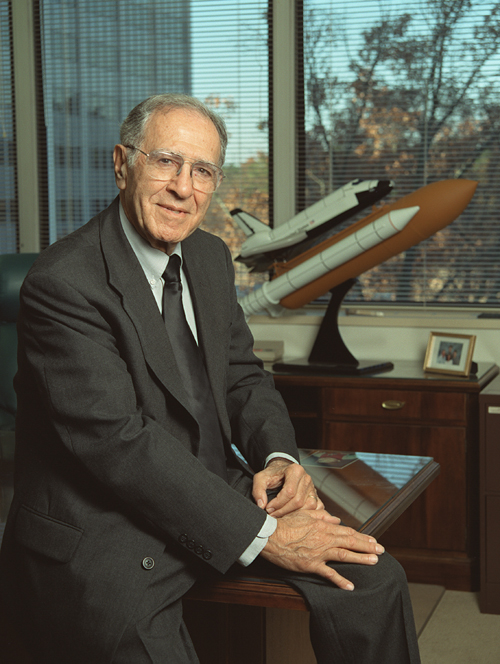I remember reading in Project Management Success Stories: Lessons of Project Leaders how you once took aside someone who was driving a forklift carrying an expensive piece of hardware and explained to him what he was handling, what it was supposed to be used for, how it would affect his life.

Project Management Success Stories: Lessons of Project Leaders by Alexander Laufer and Edward J. Hoffman
As a result, he treated the hardware like it was the most precious thing he’d ever touched. That story stuck with me. It seemed like something most project managers wouldn’t do. Some managers think they can just tell people what to do and they’ll do it because a manager gave the order. That’s one type of management style, but I’ve always felt like as a true leader it’s important to explain to people why things are important to you, and if you ask for what you want instead of demanding it, you’re a lot more likely to get it.
Is that what characterizes your management style?
Yes. I have always placed a high premium on leadership, and leading is different than managing. Not all leaders have to be managers. I’ve worked with people who’ve been just wonderful leaders, and they probably had no formal management authority whatsoever, but you could tell that they were the ones leading the group or leading the cause.
How does one recognize the real project leaders?
When there’s a problem to solve or a decision to be made, people automatically look to that person because they know that they can rely on him or her, especially if there are difficult times ahead. These are leaders not for their own benefit, but for the benefit of the project or the team. They don’t put themselves out there first.
Sometimes bad things happen to good projects. Adversity strikes. What is the role of a leader then?
First, you have to reassure the team that you haven’t lost confidence in them. You’ve got to say as soon as possible, ‘Okay, this happened, it’s unfortunate but let’s understand why it happened and how we’re going to work through it.’ You keep them focused on what’s important, and that’s solving the problem. A lot of times the people who get the most excited about the situation are actually quite removed from what’s going on in the project. It’s the leader’s job to be out there making sure they are informed and know we have a plan to address the situation. You don’t want your team to worry about their managers finding out about the problem from someone else. You want them focused on the solution.
What do you say to those managers two levels up?
Give us time to figure things out, mainly. Let us look at it and see what we can do, and whatever happens I’ll make sure that you know everything.
Do you say it that calmly?
Well, someone has to be calm. However, calm is not a word usually used to describe me! Seriously, I believe that communication counts for everything. I don’t think you can get anywhere by not being open with people.
How have you matured over the years as a project manager?
Early on I recognized that I had a hard time delegating. I now try to put myself in the position of someone else and say, ‘How would it feel if I was tasked to do something and somebody was looking over my shoulder the whole time?’ I wouldn’t like that. That’s helped me be able to say to someone, “This is the job that needs to be done. There are lots of ways to get it done. It’s up to you to decide how to do it.” I’m the kind of person whose nature it is to get into things up to my elbows. That’s the way I’ve been my whole life. I’ve got to really watch myself on that.
What can a project manager do to recognize things like this about him or herself?
On one project we did some exercises in understanding our personality types, like the Myers-Briggs test. We didn’t know each other very well, and I thought this would be a good way for us to find out about people’s strengths and weaknesses and the types of personalities we had working together. More than anything, it gave us an opportunity to talk about and learn what was important to each other.
How did you come up with the idea to do this?
Up until that particular program I had always been the kind of person who says, ‘Give me the program and get out of my way.’ This was an in-house project, which meant that we were responsible for the design, manufacture, and test with very little contractor involvement. We would be working very closely for the next several years on a challenging task with a tight budget and schedule. To accomplish our objectives, I needed to get the team to come to a consensus on issues quickly. I wanted us to develop a team environment built on trust and open communications. So how was I going to do that? I didn’t really know the answer. We brought someone in who did some facilitating with some activities like this and we found out some interesting things about ourselves. It was a real eye opener.
In what ways was it eye opening for you personally?
I’ll never forget that one of my traits was that I am impatient. The team thought it was a bad thing. I thought that was a good thing! I’ve always felt a sense of urgency, especially around things that I am passionate about. I thought, why would anyone want to be patient? I’ve never understood the expression, ‘Patience is a virtue.’ It brought home to me how I could feel something about myself and the team could feel something entirely different. No, I guess I’m not calm or patient.
How difficult has it been to change your tendencies?
Well, like I said about delegating, I have to work on it. It’s not always easy, but I think that you can, if you know people’s perceptions of you. My point is, you need to pay attention to that. There are some things bout me that I’ll never change. I hope that my sense of humor never abandons me, that I don’t get so serious I forget how to laugh. My honesty, for instance — I’m rather straightforward to a fault. I don’t really want that to change, maybe just soften a bit. I don’t want to get so good at spinning something, or sugar-coating, that it leaves me unable to communicate the true essence of what I need to say. At the same time, I hope that with age comes grace, and maybe I’ll become a little more graceful in my presentation of my thoughts and my ideas. There are other things I do want to change, like delegating responsibility and understanding that everyone does not share in my sense of urgency. When things are going smoothly, it’s easy. It’s when things start falling apart that I tend to fall back into old patterns.
I know you feel strongly about the importance of having a sense of humor. How does that help you as a project manager
It’s the only thing that keeps you sane sometimes. You can be near the end of a hardware test that has taken 14 days, 24 hours a day, and something can go wrong. Now what do you do? You can stamp your feet and rant and rave, but that doesn’t make things any better. I’m not saying you should laugh at your mistakes, but if you can find something humorous to get you through the hard times, you’re going to come out a lot healthier on the other end. If you can’t laugh at yourself, things that you’ve said and mistakes you’ve made, I think you’re going to have a hard time in life in general.
Search by lesson to find more on:
- Humor and Fun
- Delegating
- Leadership










